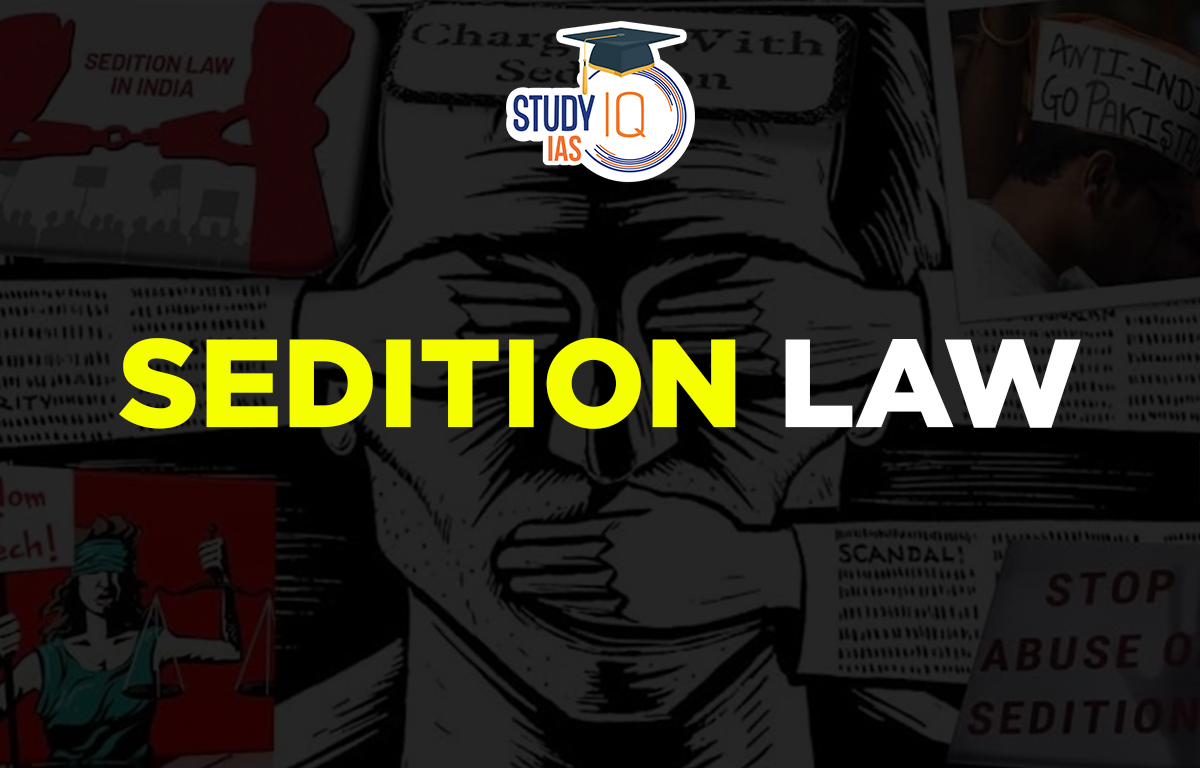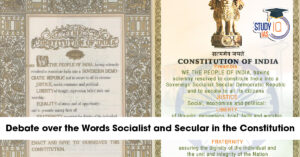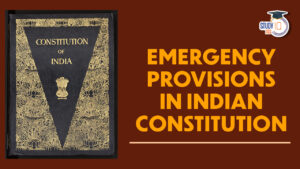Table of Contents
Sedition Law Meaning
Sedition is a crime against the state and is dealt with in Section 124A of the Indian Penal Code. Sedition punishes any content that has the potential to incite violence or public disruption in the country by inciting hatred, contempt, or disaffection for the government. When criticism is used to oppose and change legislative or administrative decisions made by the government, it is not considered to constitute seditious activity. Sedition Law refers to a body of law that criminalizes speech or conduct that is deemed to be a threat to the stability of the state or to the authority of the government.
Section 124A of IPC is a heavily criticised and misapplied section that is primarily employed to suppress political opposition. It is stated that it prevents people from exercising their right to free speech and expression. Recent progress has been made in the direction of eliminating it as a crime.
To the Supreme Court’s decision in Kedarnath Singh v. State of Bihar (1962), sedition is only a crime if it is coupled with incitement or a call to violence. As a result, Section 124A must be interpreted in light of Kedarnath Singh’s ruling, and sedition will only be considered to be an offence if it causes or is likely to cause “public disorder” or “violence.”
History of Sedition
Sedition was not a part of the Indian Penal Code (IPC) when it was first introduced in 1860. It was added in 1870, becoming a tool used by the British to silence voices fighting for freedom, targeting leaders like Bal Gangadhar Tilak, Mahatma Gandhi, Bhagat Singh, and Jawaharlal Nehru. Many were convicted for expressing dissent, even without violence.
The situation changed in 1942 when the Federal Court ruled that sedition only applied if it incited public disorder or violence. However, in 1947, the Privy Council in Britain disagreed, stating that sedition did not require such incitement, and this interpretation continued during British rule.
After India gained independence, the Constituent Assembly chose to remove sedition from the Constitution, influenced by KM Munshi, who argued it restricted freedom of speech. In 1951, the first amendment to the Constitution added “public order” as a limitation on free speech under Article 19(2).
Later, the Indira Gandhi government made sedition a cognizable offence in the Code of Criminal Procedure, 1973, allowing arrests without a warrant.
Sedition Law: Latest Update
Home Minister of India introduced the Bharatiya Sanhita Suraksha Bill, 2023 in Lok Sabha to replace the Indian Penal Code, Code of Criminal Procedure and Indian Evidence Act, and referred the laws to a standing committee.
“From 1860 to 2023, the country’s criminal justice system functioned as per the laws made by the British. With these three laws there will be a major change in the criminal justice system in the country. Home Minister added that the law on sedition has been repealed. However, upon closer inspection, one can see that the crucial provision is only introduced under a new name with a wider definition of the offence. The Bill, among other things, seeks to reinvent Section 124A of the Indian Penal Code that criminalises sedition as an offence “endangering sovereignty, unity and integrity of India.”
Proposed Changes in Sedition Law
Section 150 of The Bharatiya Nyaya Sanhita Bill, 2023 deals with the offence of sedition. However, it does not use the word sedition but describes the offence as “endangering sovereignty, unity and integrity of India.”
Anyone who intentionally encourages secession, armed rebellion, or subversive activities against India through spoken or written words, signs, electronic communication, financial means, or other actions can face severe punishment. This includes life imprisonment or up to seven years in prison, along with a fine.
The updated law also includes financial support for such activities and aims to strengthen protections by adding procedural safeguards and longer sentences. The Commission suggested adding that such actions should have a tendency to incite violence or cause public disorder, which means even an inclination to do so can lead to charges, not just actual violence or immediate threats.
Current law on Sedition
Section 124A of the IPC reads: Whoever, by words, either spoken or written, or by signs, or by visible representation, or otherwise, brings or attempts to bring into hatred or contempt, or excites or attempts to excite disaffection towards, the Government established by law in, shall be punished with imprisonment for life, to which fine may be added, or with imprisonment which may extend to three years, to which fine may be added, or with fine.
Read More: Article 19 of Indian Constitution
Sedition Law Section 124A of IPC
According to IPC Section 124 A, “Whoever brings or attempts to bring into hatred or contempt, or excites or attempts to excite disaffection towards the Government established by law in India shall be punished. According to Section 124A, sedition carries one of the following penalties:
| Penalties |
Under Section 124A, the punishment for sedition can be:
The judge decides the exact punishment during the trial. |
Sedition Constitutes
The following bullet points list the main elements of sedition:
- Words, whether spoken or written, signs, a visual depiction, or any other such act, must exist.
- An act of this nature should inspire or attempt to inspire anger, contempt, or disaffection;
- Such hatred, scorn, or disapproval must be directed at any legal government in India; and
- It must have caused public unrest or the encouragement of violence.
Read More: Right to Freedom & Article 21 of the Indian Constitution
Sedition Law in India Important Cases
Over the years, the law of sedition under Section 124A of the IPC states that a person will be charged with sedition if they “bring or attempt to bring into hatred or contempt, or excite or attempt to excite disaffection towards the Government. Its criticism can be traced back to its imposition in 1870.
Jogendra Chunder Bose versus Queen Empress (1891)
The case of Jogendra Chunder Bose vs. the Queen Empress (1891) involved an Indian merchant accused of contempt of court for publishing an article that insulted the British judiciary. He was convicted and sentenced to prison, but he appealed to the Privy Council in London, which upheld the conviction.
This case is important because it shows the tension between the British government and Indians during colonial rule, highlighting restrictions on freedom of speech. Bose criticized the 1891 Age of Consent Act, which was seen as disrespectful to authorities. However, after being granted bail, the case was eventually withdrawn.
Trial for Sedition of Lokmanya Tilak (1897)
Reports of the event were reported by Bal Gangadhar Tilak, who then published an article by Professor. Karkaria presented his work to the Bombay Royal Asiatic Society in 1894. The yearly Shivaji Coronation celebration was made possible by this publication. Tilak afterwards made the reports of the festivities public. These festivities were described as “Shivaji’s Utterances” by Tilak in his newspapers, Kesari and Mahratta.
Justice Arthur Strachey presided over the proceedings. This sedition trial is significant in history because it was an attempt to incite hostility against the government, which was classified as seditious and brought under the purview of Section 124A. The understanding of Section 124A was thus expanded. Tilak was sentenced to 18 months of rigorous imprisonment.
Sedition Trial of Lokmanya Tilak (1908)
Two Kesari articles by Tilak were published: “The Country’s Misfortune,” which appeared on May 12, 1908, and “These Remedies Are Not Lasting,” which appeared on June 9, 1908. He received a six-year prison term in Burma under the recently created Section 124A. (Now, Myanmar).
Gandhiji’s Trial for Seditious Speech (1922)
Due to the writings, he published in his journal, “Young India,” Mahatma Gandhi spent six years in prison. His Majesty’s Government formed by law in British India was accused of “bringing or attempting to arouse disaffection,” according to the charges brought against him. The Indian Penal Code’s Section 124A was described by Mahatma Gandhi as a “Prince among the political sections designed to crush the liberty of the citizen.”
Romesh Thappar v. the State of Madras and Brij Bhushan and Others v. the State of Delhi (1950)
The Supreme Court ruled that it was unlawful to impose speech restrictions on the grounds that doing so would disrupt the peace. Following the court’s ruling, Article 19 (2) of the Constitution was revised to read “in the interest of public order” instead of “undermining the security of the State.”
Kedar Nath Singh vs State of Bihar (1962)
In this instance, Section 124A’s constitutionality was put to the test. A Forward Bloc member was accused of sedition after making a speech. SC held that “Speech or writing that includes the idea of “revolution” or “subverting the government by violent means” is considered seditious. The act of sedition includes an unsuccessful attempt to incite too and also to incite chaos in public was seditious.
Balwant Singh vs State of Punjab (1962)
On the day of the assassination of former prime minister Indira Gandhi, Balwant Singh, who served as the Director of Public Instructions (DPI) in Punjab and Chandigarh among other places, is believed to have yelled pro-Khalistan chants. The top court ruled that mere sloganeering cannot result in imprisonment under Section 124A unless there is public disruption.
Read about: Article 14 of Indian Constitution
Sedition Law Supreme Court
The validity of sedition as a crime has once again come before the Supreme Court of India. In the case of S.G. Vombatkere v. Union of India 2022, it has decided to suspend Section 124A. According to the top court, all upcoming and ongoing trials, hearings, and appeals are put on hold while the Center re-examines Section 124A. An order was issued by the bench, which was led by the Chief Justice of India.
- Trials, appeals, and other Section 124A-related actions that are still underway are temporarily halted.
- If the court determines that the accused would not suffer a disadvantage, the proceedings in such circumstances are permitted when sedition is coupled with other sections.
Read about: Article 15 of Indian Constitution
Sedition Law Importance
- The law prevents anti-national, separatist, and terrorist elements from disrupting public order, inciting violence, and sowing discord.
- It contributes to the stability of the elected administration, which would otherwise be vulnerable to attempts to overthrow it violently and illegally.
- It aligns with judicial disobedience. An essential component of the executive is the elected government. As a result, government disobedience can be curbed.
Read More: Article 20 of the Indian Constitution
Sedition Laws in Other Countries
The law of sedition is not only prevalent in India but it is also used by the governments of other countries to punish whoever brings or attempts to bring into hatred or contempt, or excites or attempts to excite disaffection towards the Government established.
Sedition Laws in the USA
Even the land of freedom has not refrained from employing sedition laws to quell opposition. The Federalist administration created the Aliens and Sedition laws, which were intended to target foreigners and non-citizens who sympathised with France and were residents of the United States of America, in response to the virtual war with France.
The Sedition Act was a part of this group of laws. Americans were prohibited from speaking, writing, or publishing any defamatory or slanderous statements regarding the federal government under the Sedition Act of 1798. As press publications were the primary political instrument for political parties, this led to the targeting of Democratic-Republican journalists. The public was extremely against this law. As a result, on March 3, 1801, the Sedition Act was repealed by the incoming Republican administration.
The Sedition Act of 1918 was enacted by the American government in the midst of World War I. The Act made it unlawful to encourage disloyalty among military personnel, treason to the government, the Constitution, the armed forces, or the flag, or to support nations at war with the United States. The US Supreme Court, however, overturned this Act. Treason and seditious conspiracy are currently crimes under Articles 2381 and 2384 of the Federal Criminal Code, respectively.
Read More: Right to Equality
Sedition laws in the United Kingdom
Sedition was considered to be the same as treason during the monarchy. The divine prerogative of the King and the ideals of feudal society were declared unquestionable in the Statute of Westminster of 1275. Because the State and the Church were considered to be one and the same, seditious libel was equated to blasphemous libel. With the Sedition Act of 1661, the United Kingdom made sedition a crime.
But in 1977, the Law Reforms Committee (now the Law Commission) released a report that advocated for the repeal of the sedition laws. The Criminal Justice and Immigration Act of 2008, enacted by the democratic government, likewise eliminated the crime of blasphemous libel. Next this, the Coroners and Justice Act of 2009 repealed the laws against seditious libel and sedition the following year. It is significant to note that sedition is no longer a crime in the United Kingdom, on which Indian law is based.
Read More: Articles 12 and 13
Conclusion
Sedition is a colonial law that supports the idea of “the King is Supreme” and has no place in today’s world, where human freedoms are important. It should be abolished to protect the right to dissent, as healthy debate can help a nation grow. However, even if sedition is removed, other laws like the UAPA and NSA can still limit dissent. It’s essential to create a space for open dialogue and tolerance of different opinions. Only then can India truly express its voice.
Sedition Law UPSC
Sedition is a colonial statute that upholds the “King is Supreme” tenet. In today’s world, which values human liberty above all else, it has no place. To ensure that the right to dissent is exercised, sedition should be outlawed. Healthy disagreement should not be punished because it can aid in the country’s progress. However, sedition is only one instrument in a toolbox. The abuse of UAPA, NSA, preventative detention legislation, etc. would remain to limit the ability to dissent even when the sedition statute was repealed. The nation must promote a culture of discourse and tolerance for divergent viewpoints.


 Indian Secularism: Constitutional Provis...
Indian Secularism: Constitutional Provis...
 India Mediation Campaign, Objectives, Pr...
India Mediation Campaign, Objectives, Pr...
 Emergency Provisions in Indian Constitut...
Emergency Provisions in Indian Constitut...





















